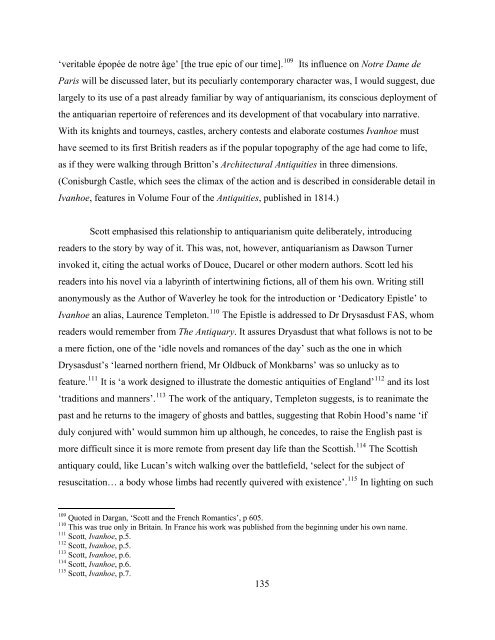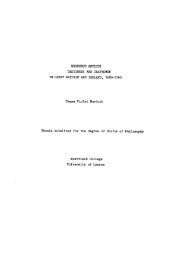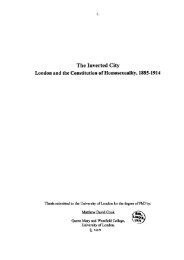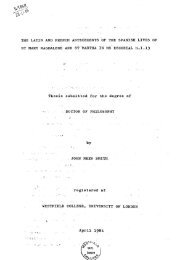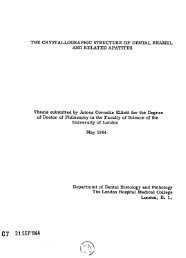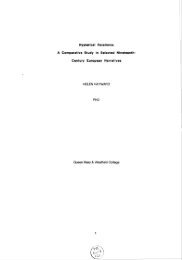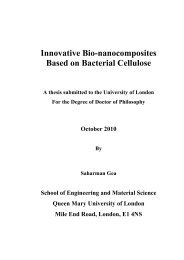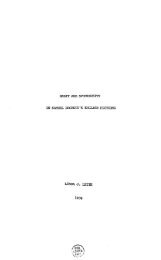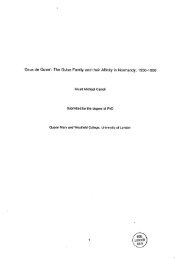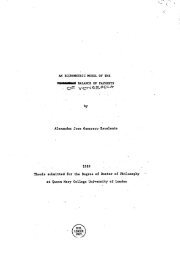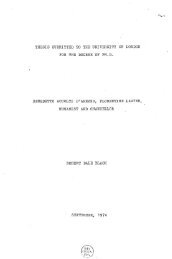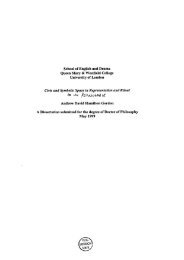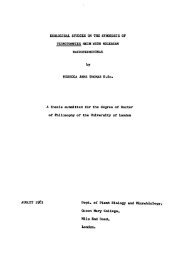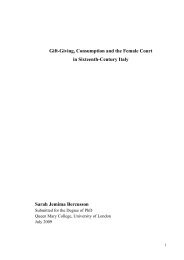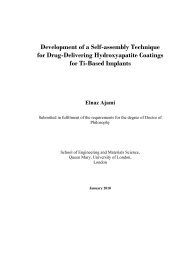Antiquaries in the Age of Romanticism: 1789-1851 - Queen Mary ...
Antiquaries in the Age of Romanticism: 1789-1851 - Queen Mary ...
Antiquaries in the Age of Romanticism: 1789-1851 - Queen Mary ...
Create successful ePaper yourself
Turn your PDF publications into a flip-book with our unique Google optimized e-Paper software.
‘veritable épopée de notre âge’ [<strong>the</strong> true epic <strong>of</strong> our time]. 109 Its <strong>in</strong>fluence on Notre Dame de<br />
Paris will be discussed later, but its peculiarly contemporary character was, I would suggest, due<br />
largely to its use <strong>of</strong> a past already familiar by way <strong>of</strong> antiquarianism, its conscious deployment <strong>of</strong><br />
<strong>the</strong> antiquarian repertoire <strong>of</strong> references and its development <strong>of</strong> that vocabulary <strong>in</strong>to narrative.<br />
With its knights and tourneys, castles, archery contests and elaborate costumes Ivanhoe must<br />
have seemed to its first British readers as if <strong>the</strong> popular topography <strong>of</strong> <strong>the</strong> age had come to life,<br />
as if <strong>the</strong>y were walk<strong>in</strong>g through Britton’s Architectural Antiquities <strong>in</strong> three dimensions.<br />
(Conisburgh Castle, which sees <strong>the</strong> climax <strong>of</strong> <strong>the</strong> action and is described <strong>in</strong> considerable detail <strong>in</strong><br />
Ivanhoe, features <strong>in</strong> Volume Four <strong>of</strong> <strong>the</strong> Antiquities, published <strong>in</strong> 1814.)<br />
Scott emphasised this relationship to antiquarianism quite deliberately, <strong>in</strong>troduc<strong>in</strong>g<br />
readers to <strong>the</strong> story by way <strong>of</strong> it. This was, not, however, antiquarianism as Dawson Turner<br />
<strong>in</strong>voked it, cit<strong>in</strong>g <strong>the</strong> actual works <strong>of</strong> Douce, Ducarel or o<strong>the</strong>r modern authors. Scott led his<br />
readers <strong>in</strong>to his novel via a labyr<strong>in</strong>th <strong>of</strong> <strong>in</strong>tertw<strong>in</strong><strong>in</strong>g fictions, all <strong>of</strong> <strong>the</strong>m his own. Writ<strong>in</strong>g still<br />
anonymously as <strong>the</strong> Author <strong>of</strong> Waverley he took for <strong>the</strong> <strong>in</strong>troduction or ‘Dedicatory Epistle’ to<br />
Ivanhoe an alias, Laurence Templeton. 110 The Epistle is addressed to Dr Drysasdust FAS, whom<br />
readers would remember from The Antiquary. It assures Dryasdust that what follows is not to be<br />
a mere fiction, one <strong>of</strong> <strong>the</strong> ‘idle novels and romances <strong>of</strong> <strong>the</strong> day’ such as <strong>the</strong> one <strong>in</strong> which<br />
Drysasdust’s ‘learned nor<strong>the</strong>rn friend, Mr Oldbuck <strong>of</strong> Monkbarns’ was so unlucky as to<br />
feature. 111 It is ‘a work designed to illustrate <strong>the</strong> domestic antiquities <strong>of</strong> England’ 112 and its lost<br />
‘traditions and manners’. 113 The work <strong>of</strong> <strong>the</strong> antiquary, Templeton suggests, is to reanimate <strong>the</strong><br />
past and he returns to <strong>the</strong> imagery <strong>of</strong> ghosts and battles, suggest<strong>in</strong>g that Rob<strong>in</strong> Hood’s name ‘if<br />
duly conjured with’ would summon him up although, he concedes, to raise <strong>the</strong> English past is<br />
more difficult s<strong>in</strong>ce it is more remote from present day life than <strong>the</strong> Scottish. 114 The Scottish<br />
antiquary could, like Lucan’s witch walk<strong>in</strong>g over <strong>the</strong> battlefield, ‘select for <strong>the</strong> subject <strong>of</strong><br />
resuscitation… a body whose limbs had recently quivered with existence’. 115 In light<strong>in</strong>g on such<br />
109<br />
Quoted <strong>in</strong> Dargan, ‘Scott and <strong>the</strong> French Romantics’, p 605.<br />
110<br />
This was true only <strong>in</strong> Brita<strong>in</strong>. In France his work was published from <strong>the</strong> beg<strong>in</strong>n<strong>in</strong>g under his own name.<br />
111<br />
Scott, Ivanhoe, p.5.<br />
112<br />
Scott, Ivanhoe, p.5.<br />
113<br />
Scott, Ivanhoe, p.6.<br />
114<br />
Scott, Ivanhoe, p.6.<br />
115<br />
Scott, Ivanhoe, p.7.<br />
135


